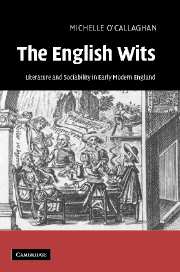Book contents
- Frontmatter
- Frontispiece
- Contents
- Acknowledgements
- Note on the text
- Introduction
- Chapter 1 Gentleman lawyers at the Inns of Court
- Chapter 2 Ben Jonson, the lawyers and the wits
- Chapter 3 Taverns and table talk
- Chapter 4 Wits in the House of Commons
- Chapter 5 Coryats Crudities (1611) and the sociability of print
- Chapter 6 Traveller for the English wits
- Chapter 7 Afterlives of the wits
- Notes
- Bibliography
- Index
Chapter 6 - Traveller for the English wits
Published online by Cambridge University Press: 22 September 2009
- Frontmatter
- Frontispiece
- Contents
- Acknowledgements
- Note on the text
- Introduction
- Chapter 1 Gentleman lawyers at the Inns of Court
- Chapter 2 Ben Jonson, the lawyers and the wits
- Chapter 3 Taverns and table talk
- Chapter 4 Wits in the House of Commons
- Chapter 5 Coryats Crudities (1611) and the sociability of print
- Chapter 6 Traveller for the English wits
- Chapter 7 Afterlives of the wits
- Notes
- Bibliography
- Index
Summary
When Whitaker jested that Coryate would make his Crudities as ‘famous, as Moore his Utopia’ (Crudities, sig. a2v), he may have been jocularly implying that his travels were a fabrication, but he was also reading Coryate's travel book within the conventions of lusus. The play between the ‘Panegyricke Verses’ and Coryate's travels both imitates and expands on the front matter to More's Utopia. The prefatory letters and verses to the Utopia identified More's account of this ‘philosophical’ city as an intellectual game which allowed its participants to play with the idea of travel, opening it to more speculative viewpoints. Coryate's curious travels similarly improvised on the conventions of humanist travel. Recent studies have portrayed Coryate as almost single-handedly initiating a radically novel mode of travel and travel writing. For Anthony Parr, the revolutionary element of the Crudities and his letters from East India resides in the way Coryate turned travel into a ludic literary performance, disclosing a ‘surplus value’ that opened the way to new travel experiences and ways of seeing. When Coryate travelled to Europe in classic humanist fashion he sought out the company of learned men and observed the city's topography, monuments and antiquities. However, his observations are less concerned with the conventional civic topics of Renaissance travel, and instead engage with memorable sights, especially rarities and curiosities.
- Type
- Chapter
- Information
- The English WitsLiterature and Sociability in Early Modern England, pp. 128 - 152Publisher: Cambridge University PressPrint publication year: 2007

